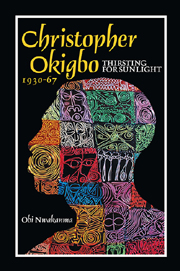Book contents
- Frontmatter
- Contents
- Preface
- Acknowledgements
- Chronology
- Dedication
- Photographs
- Maps
- Okigbo family tree
- 1 A river goddess, his mother's death & a headmaster father
- 2 Sportsman, actor & ‘effortless genius’
- 3 Cricket, classics, politics & urbane dissipation
- 4 Colonial civil servant, covert businessman & bankrupt
- 5 Poetry gives purpose to his voice
- 6 A librarian ravenous for literature & women
- 7 Gentleman, poet & publisher
- 8 Aftermath of a coup, running arms & advancing to death
- Epilogue
- Index
4 - Colonial civil servant, covert businessman & bankrupt
LAGOS 1956–58
Published online by Cambridge University Press: 05 April 2013
- Frontmatter
- Contents
- Preface
- Acknowledgements
- Chronology
- Dedication
- Photographs
- Maps
- Okigbo family tree
- 1 A river goddess, his mother's death & a headmaster father
- 2 Sportsman, actor & ‘effortless genius’
- 3 Cricket, classics, politics & urbane dissipation
- 4 Colonial civil servant, covert businessman & bankrupt
- 5 Poetry gives purpose to his voice
- 6 A librarian ravenous for literature & women
- 7 Gentleman, poet & publisher
- 8 Aftermath of a coup, running arms & advancing to death
- Epilogue
- Index
Summary
They cast him in mould of iron,
And asked him to do a rock-drill –
Man out of innocence –
He drilled with dumb-bells about him.
(‘Fragments out of the Deluge’)In 1956, there were less than three thousand Nigerians with a university education. Those naturally formed part of the elite of the colonial society. The colonial civil service offered attractive incentives to these new graduates to enter its Administrative Service. Christopher Okigbo's generation of Nigerian university graduates, newly recruited into the senior service, were given comfortable subsidized accommodation in the exclusive Government Reservation Areas. These exclusive areas known then as ‘European quarters,’ and once reserved for European staff of the colonial administration, came with a full complement of cooks and stewards. These Nigerian recruits suddenly had access to privileges formerly reserved for European members of the senior civil service.
The few multinational corporations, in the spirit of Nigerianization, were also expanding their African personnel. Some of the new graduates headed to well-established multinational corporations like the United African Company (UAC), the Unilever Group, the British-owned Nigerian Tobacco Company (NTC) which guaranteed them comfort and career advancement. Looking to the emergence of post-colonial opportunities in business, they wooed these new graduates with salaries that made civil service prospects pale in comparison. However many young university graduates owed bonds to their communities or to the government, and needed to pay off debts as quickly as possible, while maintaining a lifestyle commensurate with their new social status.
- Type
- Chapter
- Information
- Christopher Okigbo 1930–67Thirsting for Sunlight, pp. 98 - 120Publisher: Boydell & BrewerPrint publication year: 2010

